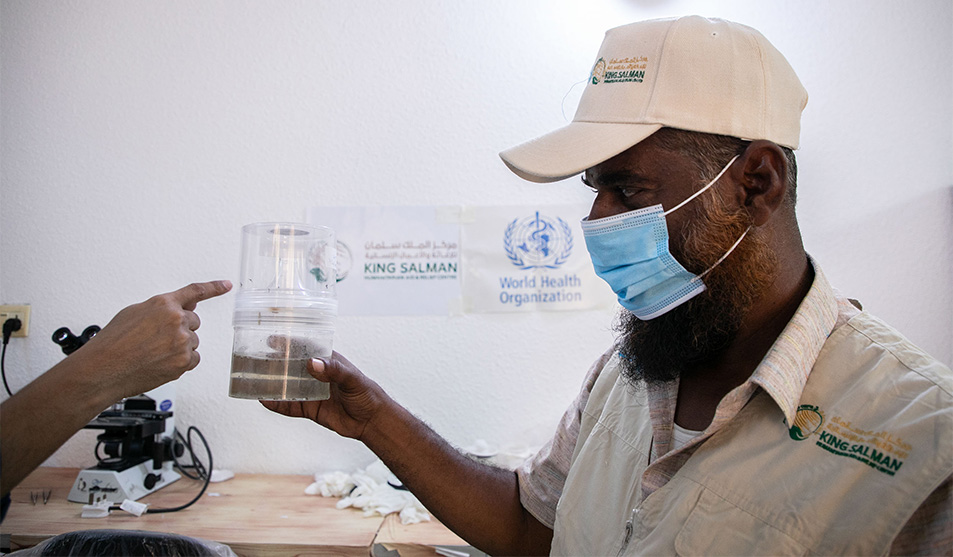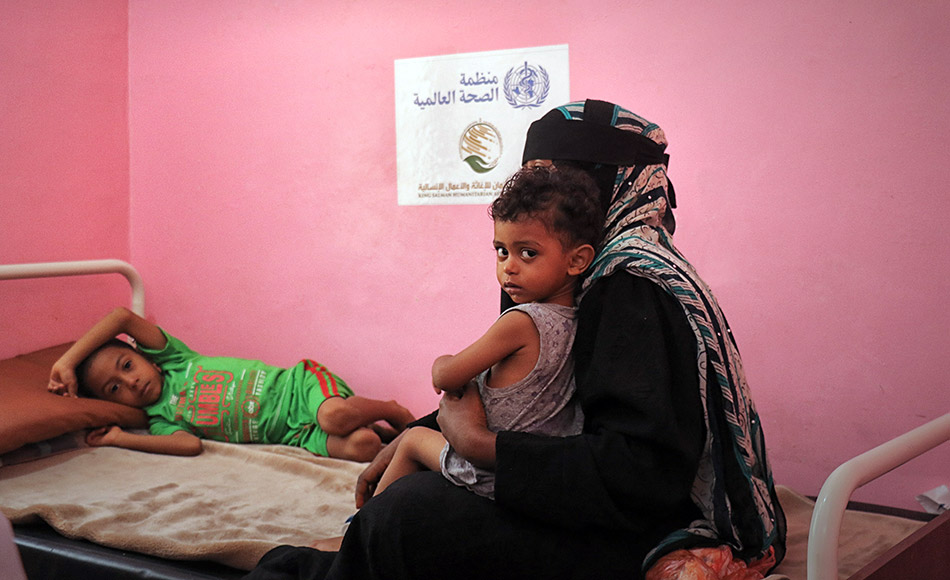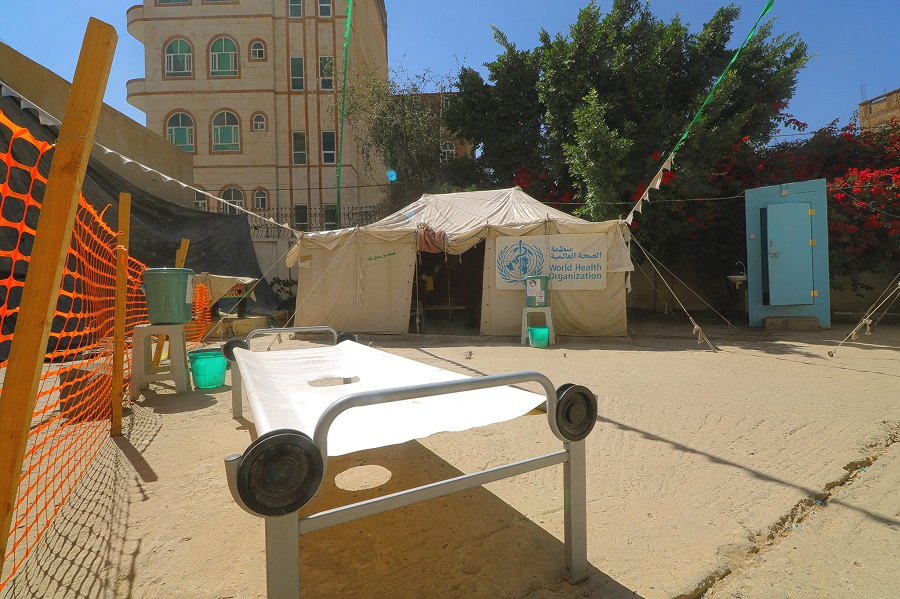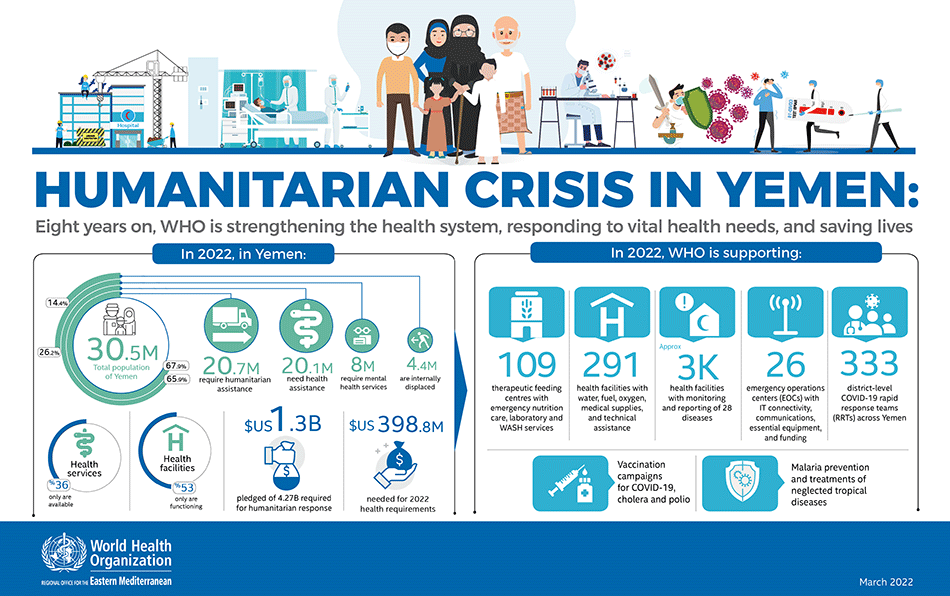Taking the battle against malaria to its source – the mosquito

14 April 2022 Despite significant declines in recent years, malaria still represents a serious public health problem in Yemen – especially against the backdrop of a war that has been raging since 2014, the country’s associated economic collapse, and the healthcare system’s limited capacity throughout the COVID-19 pandemic.
WHO and KSrelief join efforts in the fight against child malnutrition in Yemen

13 April 2022 (WHO) – With support from the King Salman Humanitarian Aid and Relief Centre (KSrelief), the World Health Organization (WHO) has begun providing essential medicines, equipment, and training to eight high-priority hospitals in Yemen for treating severe acute malnutrition among children under the age of five.
WHO will support the pediatric units of these hospitals with essential medicines and equipment, training of health workers, and 192 PED/SAM kits for treating childhood illnesses including severe acute malnutrition with medical complications.
“This is a life-saving intervention for thousands of children, to strengthen nutrition into child health,” said Dr Adham Rashad Ismail Abdel-Moneim, WHO Representative to Yemen. “In addition to providing vital support to hospitals treating suffering children, the programme has also strengthened knowledge within communities about nutritional and health needs of infants and young children. This will help reduce morbidity and mortality related to malnutrition.”
Under the programme, nutrition and health care knowledge for children, adolescents and mothers will be spread through social media, TV, radio, and other communication channels to more than 3 million people in Yemeni districts faced with overall acute malnutrition rates of more than 15% -- the WHO emergency threshold. The programme will directly benefit some 18,000 children to be treated at these eight hospitals during the next nine months. Health worker knowledge and technical competencies will also be boosted for treating and mitigating recurrence of severe acute malnutrition cases among Yemeni infants and children. Household child caregivers will also be instructed in Infection prevention control (IPC) and COVID-19 control measures.
Yemen’s eight-year civil conflict and resulting economic and infrastructure collapse have heightened the country’s risk of famine, with two-thirds of Yemen’s districts now classified as “pre-famine” by the United Nations Office for the Coordination of Humanitarian Affairs (UNOCHA).
Last year, WHO supported 109 TFCs with vital medical and laboratory supplies as well as water, sanitation and hygiene (WASH) services. These TFCs provided life-saving nutrition services to about 21,000 infants and children. Some 94% of infants and children treated at the TFCs survived, and only 2% are known to have relapsed.
“WHO-Yemen has and will continue to focus on doing whatever we can to reduce the tremendous suffering that accompanies catastrophic levels of malnutrition in Yemen,” Dr Abdel-Moneim concluded.
WHO and KSrelief join efforts to improve water, sanitation and hygiene services in Yemen

11 April 2022 – In response to Yemen’s historic cholera outbreak and the heightened risk of other infectious diseases, the World Health Organization (WHO) and the King Salman Humanitarian Aid and Relief Center (KSrelief) have joined forces to improve water, sanitation and hygiene (WASH) at health facilities throughout the country’s southern region.
The programme has targeted 45 health facilities in 19 governorates and 33 districts in southern Yemen at high risk for cholera, which is spread through water and food contaminated with faeces. The WHO programme is also improving safe disposal of medical waste, including hazardous used syringes, and strengthening water quality monitoring and surveillance in the 33 high-risk areas.
“We are protecting vulnerable communities by improving WASH services in health care facilities, and through routine water quality surveillance and disinfection,” said Dr Adham Abdel Moneim-Rashad, WHO Representative to Yemen. “It is a simple but powerful programme to combat a number of preventable diseases – but particularly cholera.”
Amid a 7-year war, Yemen is experiencing waves of cholera outbreaks due to the collapsed health system, absence of basic services, including water systems and networks, poor sewage disposal systems, and high displacement of individuals fleeing escalating violence.
The ongoing cholera epidemic, which began in April 2017, is considered the worst in the world since records began. The number of reported suspected cases already exceeds 1.9 million, and cholera has spread to some 96% of Yemen’s governorates since the beginning of the outbreak.
Widespread malnutrition is increasing susceptibility to outbreaks of cholera and other communicable diseases. Vector-borne diseases are surging, including dengue fever and malaria, and severe acute respiratory infections such as COVID-19. Because of a decline in vaccination amid the war, there have been new outbreaks of vaccine-preventable diseases, including polio, which can cause paralysis in children and had been eliminated in Yemen.
The ongoing KSrelief-funded WHO programme targets diseases that are spread due to lack of clean water and sanitation. WHO is rehabilitating and improving infrastructure instrumental to water safety and quality at the 45 targeted health care facilities. The upgrades have included fixing sinks, toilets, and plumbing, and installing water tanks.
The programme includes installation of incinerators at 25 facilities to allow for safe disposal of medical waste. Awareness training about proper medical waste management has been conducted at all of the facilities. Personal protective equipment, disinfection and hygiene improvement supplies were distributed to 280 health care facilities to prevent hospital acquired infections among staff, patients and visitors.
Water quality monitoring and surveillance has been initiated or improved in the 33 cholera high-risk districts. Mobile water testing kits, chemicals and reagents are being provided to water supply providers in 6 governorates in the high-risk districts. Permanent water quality testing laboratories in Aden, Mukalla and Taiz are being established to enhance the capacities of regular water quality monitoring by water supply providers.
The programme has also included delivering more than 24.5 million gallons of fresh water by truck to 80 health care facilities.
“Cholera has caused immense suffering in Yemen,” Dr Moneim-Rashad said. “We are committed to reducing its spread, and that requires greatly expanding access to clean, safe water.”
Humanitarian crisis in Yemen: eight years on, WHO is strengthening the health system, responding to vital health needs, and saving lives
27 March 2022 - Since 2015, Yemen has faced a severe and complex humanitarian crisis due largely to the growing activities of armed groups, inter-community tensions, and economic decline.
The Yemen crisis is also linked to additional factors such as food and nutrition insecurity, COVID-19, other disease outbreaks, climate change, and natural disasters. A devastated health system, disruption of water and sanitation networks, and massive numbers of displaced people have fueled the rapid spread of diseases including cholera, diphtheria, measles, polio, and dengue.

Yet, amidst the devastation, the Yemeni people remain determined, resilient and hopeful.
Today, WHO continues to play a leading role in advising and supporting Yemen health authorities, partners and community health workers in their efforts to sustain essential and life-saving health facilities and services throughout the country, and reaching the most vulnerable populations. WHO is also ensuring life-saving medical and nutrition care for children suffering of severe acute malnutrition (SAM) with medical complications. Medical supplies and equipment are being delivered to COVID-19 isolation centers and emergency operations centers (EOCs) that coordinate responses to all public health emergencies, with nearly 300 health facilities provisioned with fuel, oxygen, water and medical supplies and equipment, allowing them to:
admit 322,454 patients
conduct 6.5 million outpatient consultations
deliver 139,888 babies
perform 37,496 caesarian sections
conduct 246,679 major and minor operations
immunise 104,234 children for Penta 3
The health needs of the Yemeni people are expected to become even more urgent and widespread in 2022, unless there is conflict de-escalation, improvement in the economy, and available funding for humanitarian response sectors, including the health sector.
Although health assistance to Yemen remains severely underfunded, WHO is prioritizing continuity of services and functionality of operation theatres, ICUs and COVID-19 testing and treatment centers. WHO also continues working to provide life-saving medical equipment, essential drugs, supplies, and other support and services so that most vital health services remain available for the Yemeni people.
WHO continues to call on all parties in Yemen to facilitate humanitarian access, and to protect civilians, health workers, patients, and healthcare facilities.








